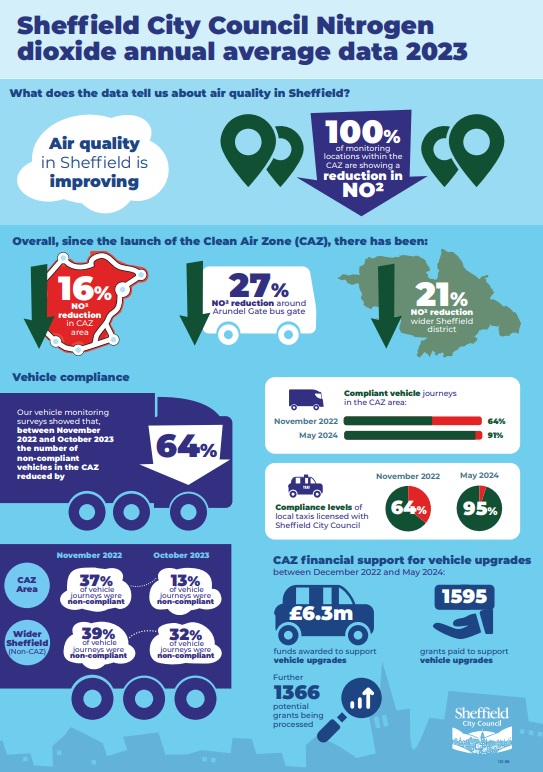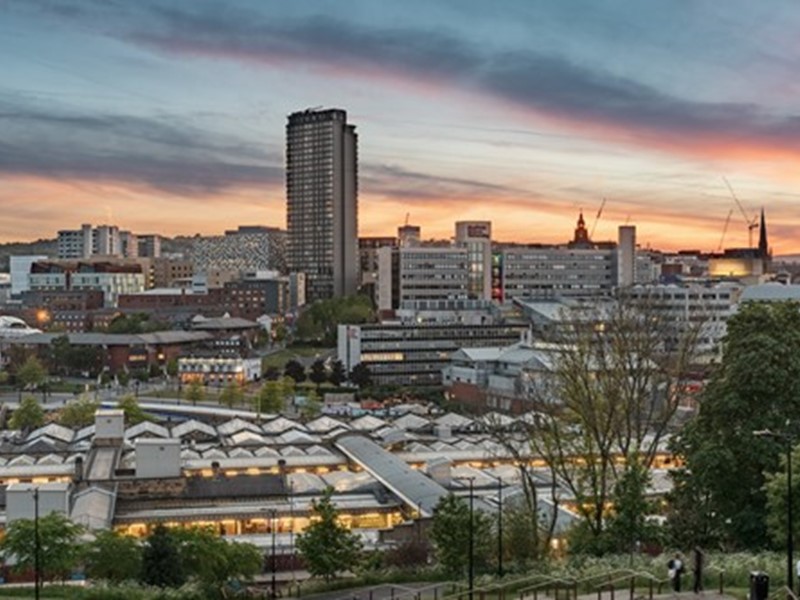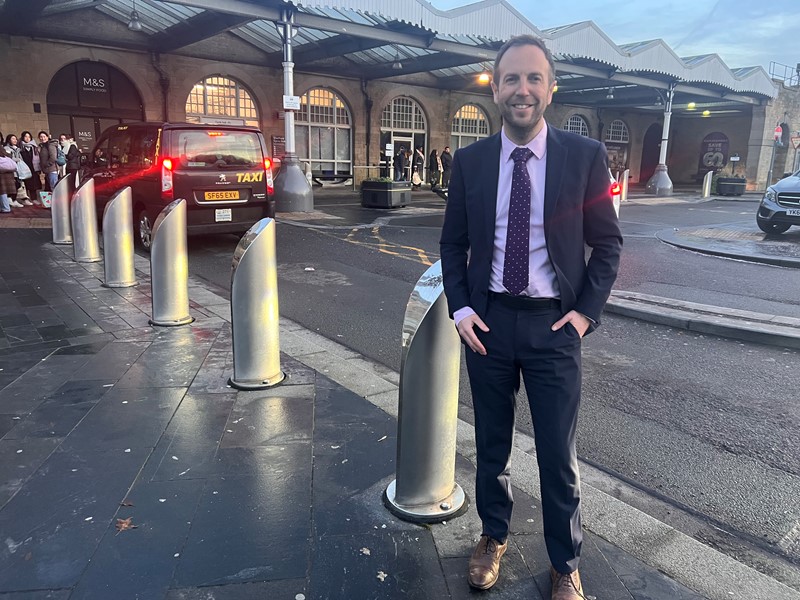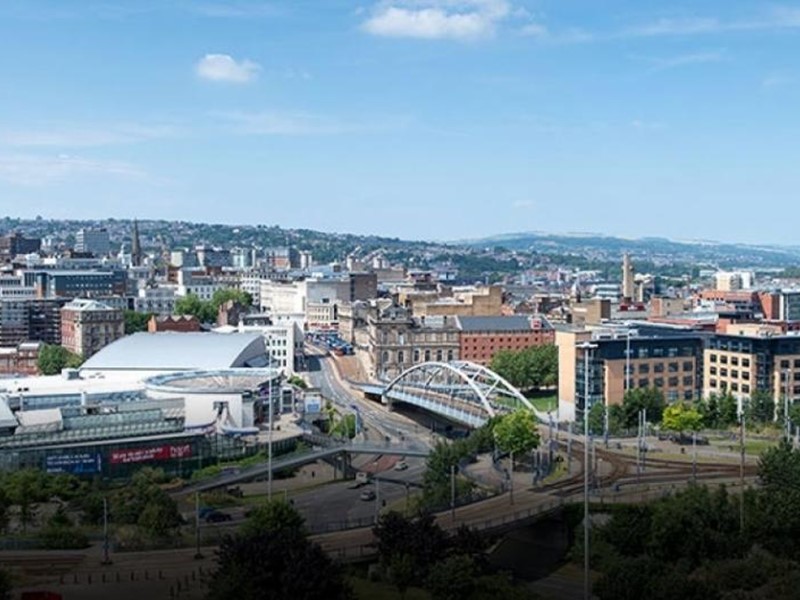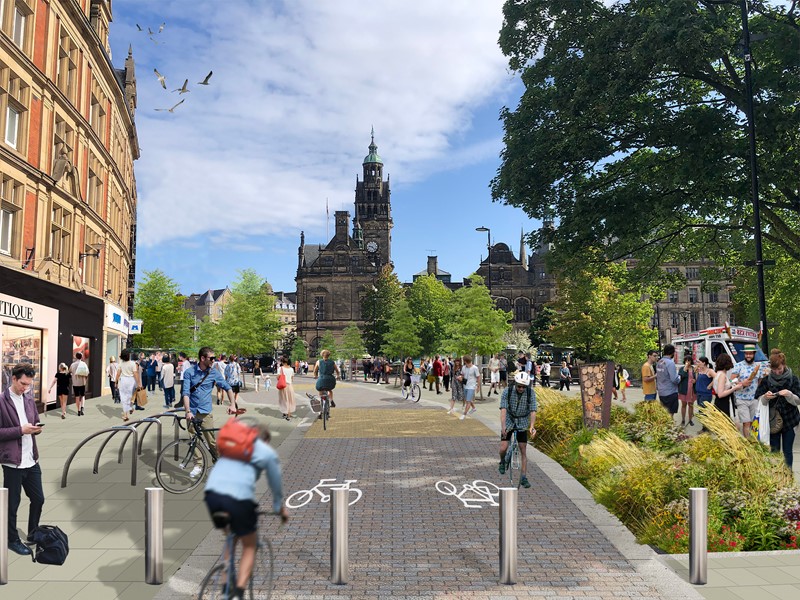Following the Clean Air Zone’s (CAZ) one-year anniversary in February, we are now able to take an early look at the impact the CAZ is having on the quality of the air we breathe in Sheffield, and the news is very positive. Our 12-month annual average data for 2023 is showing that the level of Nitrogen Dioxide (NO2) in Sheffield, caused by road pollution, has significantly improved, which is great news for the health of everyone in Sheffield.
Pollution levels across Sheffield drop following the launch of the Clean Air Zone
Over a year on from the launch of Sheffield City Council’s Clean Air Zone, annual average data for 2023 shows that the level of nitrogen dioxide (NO2) from road traffic pollution has fallen significantly across Sheffield.
Sheffield’s Clean Air Zone (CAZ), which commenced on Monday 27 February 2023, requires the most heavily polluting vehicles to pay a daily charge to drive into Sheffield’s inner city and ring road. Vehicles impacted include heavy good vehicles, light goods vehicles, vans, taxis, buses and coaches. Motorbikes and private passenger cars are not affected.
The 2023 annual average air quality data, from January to December 2023, is showing positive results for the reduction of NO2 caused by road traffic pollution. A reduction in NO2 has been observed across 100 per cent of monitored locations in Sheffield’s Clean Air Zone CAZ, when compared to the year before, with an overall NO2 reduction of 16 per cent across the CAZ area since its launch.
Beyond the CAZ area, an average NO2 reduction of 21 per cent has also been observed across the wider Sheffield district in 2023.
Following the implementation of the bus gate at Arundel Gate in March 2023, the level of NO2 observed in the bus-gate area has dropped by 27 per cent in 2023. This has brought the area within legal NO2 levels in 2023 - compared to the previous year, when it was not compliant.
Ahead of the CAZ going live, the council launched its Financial Assistance Schemes (FAS). The schemes have been extremely successful, with 1,081 people taking up the offer of grants to upgrade or replace their non-compliant vehicles with cleaner ones, and 514 people applying for retrospective funding for vehicles they have already upgraded or replaced to cleaner ones. A total of 1,595 grants have been paid up until the end of May 2024.
Sheffield City Council’s taxi fleet is now 95 per cent compliant, as of May 2024, compared to the 64 per cent compliance in November 2022, before the CAZ was introduced, and the number of journeys made into the CAZ by compliant vehicles has increased from 64 per cent to 90 per cent as of May 2024.
Data on vehicle journeys shows us that traffic volumes into the CAZ have not decreased since the CAZ launched. The significant level of NO2 reduction observed in 2023 across Sheffield shows the positive impact of the vehicle upgrade observed and indicates the success of the Financial Assistance Schemes in helping people to upgrade - resulting in accelerated air quality improvement, not just in the CAZ, but right across Sheffield.
Cllr Ben Miskell, Chair for the Transport and Regeneration Committee for Sheffield City Council, said: “I’m really pleased to share that air quality in the city is improving. Data collected as part of the Clean Air Zone shows that air pollution caused by vehicles has dropped right across the city, and we’re seeing that more and more people and business are making the switch to cleaner vehicles – it’s a fantastic achievement for Sheffield.
“In the coming year we expect to see even further improvements in our air quality, but there’s much more to be done to make sure that Sheffield’s air quality levels move closer to those recommended by the World Health Organisation.”
Whilst the data covers the calendar year for 2023, full charging for the Zone did not commence until 5 June 2023, due to the exemptions the council put in place for local Light Goods Vehicles and Hackney Carriage taxis.
Cllr Miskell added: “This is a brilliant start, but it is only a start, however, I want to take this opportunity to thank business and people across Sheffield who have made the transition to cleaner, less polluting vehicles.
“Together, we’re improving air quality, not just for now, but for the generations to come.”
The Sheffield Connect electric buses makes the city centre more accessible for everyone, whilst providing residents and visitors with a cost free, quick, easy and zero emission way to travel.
There’s more to be done to upgrade Sheffield bus fleet to become cleaner and greener, and the council is already working with partners to progress investment in cleaner buses. We have ambitions for a zero-emission bus fleet across the region will continue to work closely with Ministers, operators and the South Yorkshire Mayoral Combined Authority to explore future opportunities.
The council is also improving the existing network of electric vehicle charging points, making it easier and more convenient for people to make the switch from polluting vehicles to electric.
Whilst significant improvement in NO2 reduction has been observed across Sheffield, some locations have improved but remain above legal NO2 levels in 2023. These are on Waingate, Attercliffe Road, Sheaf Street, Meadowhall Road and at Arundel Gate interchange. Members of the Transport, Regeneration and Climate Policy Committee will also be asked, on Wednesday 24 July, to approve plans to make bus gates on Arundel Gate and Furnival Gate permanent in order to continue to improve the air we breathe in those two locations.
The council is assessing the unique circumstances and pollution sources at each location in exceedance, to better understand the issues and understand what can be done to accelerate NO2 reduction at these locations.
Greg Fell, Director of Public Health for Sheffield City Council, said: “Whilst our first look at the annual average data is very positive, this is no time to slow down on clean air initiatives. We know that there are some locations across Sheffield that are still in exceedance of legal air quality limits, so there’s more to be done to improve the air we breathe.
“Legal limits for air pollution are set by the Government. However, these limits are not as strict as guidelines suggested by health experts like the World Health Organisation. This means that while the air might be considered "safe" by law, it is still harmful to our health, especially for children, older people and cause problems like asthma, heart disease, and other illnesses.
Sonal Kansra, Respiratory Consultant at Sheffield Children’s NHS Foundation Trust, said: “It is vital that children breathe in only clean air. Children’s lungs are still developing and breathing in poor quality air can impair the healthy development of their lungs leading to stunting of lung growth.
“Air pollution can affect not only lungs but in fact all organ systems and this impact starts before birth. Air pollution increases the risk of respiratory illnesses and can trigger attacks in children with asthma. It is vital that we all look at ways we can contribute to reducing the impact air pollution on children and future generations.”
Greg Fell continues: “To make the air healthier for everyone, it's important we keep working towards lowering pollution levels, closer to what health experts recommend. This means it's important for all of us to continue work together to reduce pollution to make the air safer for everyone to breathe. The neighbourhoods we live in should be places that support us to be healthy and well, as well as being nice places to live.
“The Clean Air Zone is just part of the work we’re doing to transform our city centre into a healthier, greener, and cleaner place for everyone to be. Through our regeneration we are creating a thriving, liveable and sustainable city fit for the future.”
For more information about the Clean Air Zone, head to the website by clicking here.
